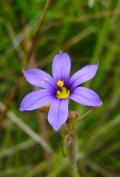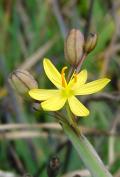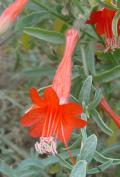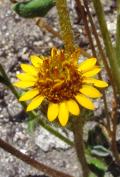 |
 |
 |
 |
 |
|
|
|
|
|
Southern California
Wildflowers Guide to the Pronunciation of Specific, Generic and Family Names |
| For a more detailed essay on botanical pronunciation, click here. If you have a contrary opinion as to any of the phonetic spellings listed here, please feel free to contact me at: mmlcharters[at]gmail.com. |
In those cases where there are similar forms of names such as peninsulare and peninsularis which follow the same pronunciation, I have only included one. I have attempted to spell these names phonetically as closely as possible to the way I say them. It is sometimes very difficult without using pronunciation symbols to spell phonetically the way a word sounds. For example, how do you easily convey by phonetic spelling the difference between the 'th' in 'thee' and 'theme', the different sounds an 'O' makes in the words 'off,' 'comb,' 'come,' or 'cotton,' or the different ways of pronouncing an 'E' in the words 'pet,' 'they,' 'crooner,' and 'median'? So even though I have tried to be as consistent as possible, my choice of spelling is an imperfect one, and you may not agree with the way I have done it. However I believe in most cases that it does convey an accurate pronunciation. The stressed syllable is the one that is capitalized. This guide contains the names of all the taxa in my website. And in case it is not obvious, I adhere for the most part to the American/English manner of pronunciation. However, for the sake of what sounds better to my ear, I occasionally depart from this practice. Names in yellow are alternative pronunciations. I should point out that I am not of the opinion that in all cases there is only one 'correct' way to pronounce a name, so if others differ in their pronunciations, so be it. There is a general rule that if the penultimate syllable ends in a consonant as in the epithet microphylla (syllabized as mi-kro-fil-la), that's where the accent lies (my-kro-FIL-la), but if the penultimate syllable ends in a vowel as in the epithet Nemophila (syllabized as ne-mo-phi-la), the accent goes to the antepenultimate syllable (neh-MOF-i-la). The case of personal names converted into botanical names is one of the most vexing, and the one that I have struggled over the most. I have simply given up on trying to maintain any consistency. I usually attempt to preserve the pronunciation of the original name when it sounds right to me as with newberryi (NOO-ber-ee-eye), adamsii (AD-ams-ee-eye), Brodiaea (BRO-dee-a) and purshii (PER-she-eye) but it is not always possible to do it gracefully, and in many cases I find myself ignoring the Jepson Manual advice because I just don't like the resulting sound, as with most multi-syllable names such as davidsonii (day-vid-SONE-ee-eye), heermannii (heer-MAN-ee-eye), abertii (ay-BERT-ee-eye), Brickellia (brik-ELl-ee-a) and hendersonii (hen-der-SONE-ee-eye). I think this is the reason that there is a general rule in the pronunciation of Latin words that no syllable before the antepenultimate should be stressed, because it just sounds weird. The bottom line for me is that when the resulting botanical name contains either two or three syllables, it is always possible to stress the first syllable comfortably (IVES-ee-a, AK-ton-eye, BOWL-zee-a, NEE-lee-eye) but when there are four or more syllables it usually becomes awkward. The case of foreign names adds an additional complexity, since in these situations as with domestic names we are advised to maintain the original pronunciation. Gilia, for instance, therefore should be pronounced JEE-lee-a, because since it is an Italian name we should follow Italian pronunciation rules, according to which a 'g' before an 'i' is pronounced like the 'j' in jello, and an 'i' is pronounced as EE. Pluchea derives from the French name Pluche (pronounced PLOOSH), so Pluchea should be pronounced PLOOSH-a. Likewise Viguiera, which most people pronounce vi-gee-ER-a, from the French name Viguier (pronounced VI-gwee-ay) should be pronounced vi-gwee-AY-a, and Jaumea, which people pronounce in a variety of ways (jow-MEE-a, jaw-MEE-a, JAW-mee-a) from the French name Jaume (pronounced ZHOME) should be pronounced ZHOME-a. However I have little expectation that these names will ever be pronounced in this fashion. A list of family name pronunciations for California plant families follows the genus and species name list. |
| Keep this in mind that...... "A foolish consistency is the hobgoblin of little minds." Ralph Waldo Emerson "Consistency is the last refuge of the unimaginative." Oscar Wilde "Consistency is contrary to nature, contrary to life. The only completely consistent people are the dead." Aldous Huxley "No well-informed person ever imputed inconsistency to another for changing his mind." Cicero |
|
Genus and Species names quadrifo'lia (kwad-ri-FO-lee-a) xalapen'sis (za-la-PEN-sis) Ya'bea (YAH-bay-a) (Pronunciation based on personal name) |
|
Photograph identifications, L-R: Idaho
blue-eyed grass (Sisyrinchium idahoense var. occidentale), Yellow-eyed grass (Sisyrinchium elmeri), Hoary fuchsia (Epilobium canum
ssp. canum), Western mountain aster (Aster occidentalis var. occidentalis),
Beautiful hulsea (Hulsea vestita ssp. callicarpha)
|